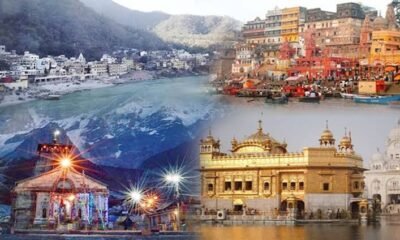Travel Guides & Articles
Kashmir travel plans unravel as cancellations surge | Mumbai news

MUMBAI: A day after the terror attack in Pahalgam, vacationers are already cancelling travel plans to Jammu & Kashmir. An idyllic destination for tourists, especially during summer vacations, J&K is being struck off the bucket list of many – for now, at least.
The Maharashtra Tour Organisers’ Association claims as many as 5-7 lakh tourists from Maharashtra alone head to J&K every weekend during summer. While small groups cater to 20-30 tourists, larger operators accommodate 100 tourists per trip.
“Tourism had revived after the abrogation of Section 370 in 2019, and was booming lately. It is hard to say whether Tuesday’s attack will have a long-term impact but, for now, clients are cancelling their bookings for Jammu & Kashmir for the next 15 days,” said Dilip Yadav of Tulip Holidays, a member of the association.
Apart from Pahalgam, other popular locations in the Kashmir Valley, such as Gulmarg, have shut their doors to visitors in the wake of the attack. “Pahalgam became a tourist hot spot thanks to social media influencers,” said another tour operator.
While acknowledging the human tragedy in Pahalgam, many tourists looking forward to a memorable vacation in the Valley are either cancelling or reconsidering their plans. “My sister-in-law from Pune was to leave for a week-long trip to Kashmir with a group of eight on Tuesday. Their flights were booked and accommodation arrangements made. Now she has decided not to go,” said Madhu Awasti, a Navi Mumbai resident.
A women’s travel group from Vashi was on the verge of finalising bookings for an eight-day trip covering Srinagar and Pahalgam in May. “On Monday, I checked flight rates to Kashmir and was ready to book. Now we’ve decided to wait,” said Bhavna Bhatia, a group member and frequent traveller to Kashmir since 2011. This is the first time Bhatia is cancelling a trip to the Valley. “I’m now hoping to go in November, provided the situation stabilises,” she added.
For the Quadri family from Jogeshwari, a trip to Kashmir was to be the perfect escape from Mumbai’s scorching summer. The five-member family had locked their itinerary, but Tuesday’s attack has prompted them to reconsider. “We were to travel at month-end and had a budget of ₹50,000 per person. Now we have shelved our plans. We’ll probably stretch the budget and opt for an international destination, possibly Thailand,” said Suleiman Quadri.
But what of tourists who are already in the Valley? Tour companies say they have had to make last-minute changes in their itineraries for their clients. According to Veena Patil, who owns Veena World, “Many want to cancel and come back.”
Patil said some of her clients who were already in Kashmir had to improvise. “The area (in Pahalgam) is cordoned off. As a result, tourists are heading for Sonmarg and Srinagar. Hotel rooms are unavailable in Srinagar,” she said.
Shailesh Patil of Kesari Travels said his company had not had any cancellations but his clients were worried. “We had four groups in Pahalgam. They will complete their tours and return to Srinagar.’’
Vishwajeet Patil of Raja Rani Travels, revealed, “With no entry into Pahalgam, we are receiving many requests to cancel advance bookings for trips to Kashmir, but we are asking our clients to reconsider. Besides, we have paid hotel and cab owners for future tours. Locals also want to return to normalcy,” Patil said.
Prabhulal Joshi, who owns Heena Tours, said his company too was flooded with cancellations. “Many have sought cancellations. Some want to travel to other destinations.’’
Meanwhile, the Union tourism ministry issued a directive to all tourism service stakeholders to waive cancellation fees and provide the necessary support to ease travel disruptions due to the Pahalgam attack. Addressed to major online travel aggregators, travel agencies, tour operators, hoteliers and transport providers, the ministry requested immediate support and cooperation.
The letter, signed by Secretary (Tourism) V Vidyavathi, specifically named platforms such as MakeMyTrip, Yatra, Goibibo, ClearTrip, EaseMyTrip, Ixigo, Airbnb, Agoda, Thrillophilia, Booking.com and Expedia, along with tourism and hospitality industry associations.
Travel Guides & Articles
Air India and Air Astana sign codeshare agreement to boost India–Kazakhstan connectivity

Air India and Air Astana, the flag carrier of Kazakhstan, have signed a new codeshare agreement to offer more flight options to travellers.
The codeshare partnership enables cooperation between the two carriers on trunk routes between Kazakhstan and India, covering Air Astana routes operated between Almaty and Delhi, and Almaty and Mumbai. With this, Air India will place its ‘AI’ designator code on Air Astana’s flights to and from India, providing its customers convenient access to Almaty, a rapidly growing tourism and business hub in Central Asia.
Air India customers travelling to Almaty from points beyond Delhi and Mumbai will be able to conveniently travel on a single ticket and check-in their baggage through to Almaty at the point of origin.
Campbell Wilson, Chief Executive Officer & Managing Director, Air India, said “Our new codeshare partnership with Air Astana creates stronger air links to Kazakhstan, a fast-growing market with immense potential for tourism. Beyond serving leisure travel demand, our partnership will also support trade and cultural exchanges between our two countries, while bringing a new destination in Central Asia closer to our customers.”
Peter Foster, the Air Astana Group’s Chief Executive Officer, commented on the codeshare with Air India, “We are delighted to have concluded a comprehensive code share agreement with Asia’s oldest airline. Air India is an exceptionally well-managed business, which operates a comprehensive network of flights to, from and across India, the world’s most populous country and one of the fastest growing travel markets. India is of key strategic importance to the Air Astana Group as we increase flights from Kazakhstan to Delhi, Mumbai and Goa. The code share will accelerate the increasingly strong business, tourist and student traffic flows between our two countries”.
The new arrangement builds on an existing interline partnership between Air India and Air Astana that came into effect earlier in 2025. Under the interline agreement, Air India customers already have convenient connections via Almaty to multiple destinations across Central Asia and China including Astana (Kazakhstan), Bishkek (Kyrgyzstan), Tashkent (Uzbekistan), Dushanbe (Tajikistan) and Urumqi (China). Air Astana enjoys access to 18 destinations across Air India’s domestic network and 9 international destinations via Delhi and Mumbai.
With this step-up to a codeshare agreement, travel between India and Kazakhstan becomes more convenient for customers while also opening a wider network of destinations through a single booking and check-in process.
Subject to regulatory approvals, the codeshare flights will be progressively made available for sale across Air India’s booking channels, including the airline’s official website, mobile app, and through travel agents worldwide.
Travel Guides & Articles
Pilgrimage travel emerges as fast-growing tourism segment: MMT

India’s tourism sector is witnessing a strong surge in pilgrimage travel, with accommodation bookings across 56 spiritual destinations rising by 19% in FY24-25, according to MakeMyTrip’s latest report. The trend highlights how religious journeys are becoming a major driver of travel demand, spreading beyond traditional hubs into newer destinations.
The report notes broad-based growth, with 34 destinations recording double-digit increases and 15 posting over 25% expansion. Established centres such as Varanasi, Ayodhya, Puri, Amritsar and Tirupati continue to attract large footfalls. Simultaneously, emerging locations like Khatushyam Ji in Rajasthan, Omkareshwar in Madhya Pradesh and Thiruchendur in Tamil Nadu are witnessing rapid growth, signalling a widening spiritual canvas.
Pilgrimage trips are increasingly characterised by short, purpose-led stays. Over half of the travellers (53%) opt for single-night visits, while only 5% extend their stay beyond four nights. Interestingly, more than 63% of bookings are made within six days of travel, underlining the last-minute planning habit typical of Indian travellers.
Group travel is another defining feature. Nearly 47% of pilgrimage trips are booked by families, friends or community groups, compared to 39% in leisure tourism. This collective nature underscores the deeply shared and cultural dimension of spiritual journeys, where religious visits are often seen as community experiences.
Accommodation supply has also expanded rapidly to meet rising demand. Over the past three years, more than one-third of all hotel rooms at pilgrimage centres have been added, along with a sharp increase in homestays and hostels. Premium stays are gaining traction too, with bookings above INR 7,000 per night rising by over 20% in FY24-25.
Interestingly, a growing number of travellers are combining spirituality with leisure. MakeMyTrip found that while 52% of holiday packages were booked exclusively for pilgrimage, nearly 48% blended spiritual destinations with cultural or recreational stops. This dual demand is prompting the industry to innovate, positioning pilgrimage not just as faith-based travel but also as a holistic cultural tourism experience.
Travel Guides & Articles
These national parks will reopen for tourists in October

Wildlife adventures in October
Every year, India’s national parks close during the monsoon to protect both wildlife and visitors. Come October, as the rains retreat and the forests burst back into life, many of these parks reopen their gates. It’s the perfect time for safaris, so get ready for some exciting wildlife adventures.
-

 Business2 weeks ago
Business2 weeks agoThe Guardian view on Trump and the Fed: independence is no substitute for accountability | Editorial
-
Tools & Platforms4 weeks ago
Building Trust in Military AI Starts with Opening the Black Box – War on the Rocks
-

 Ethics & Policy1 month ago
Ethics & Policy1 month agoSDAIA Supports Saudi Arabia’s Leadership in Shaping Global AI Ethics, Policy, and Research – وكالة الأنباء السعودية
-

 Events & Conferences4 months ago
Events & Conferences4 months agoJourney to 1000 models: Scaling Instagram’s recommendation system
-

 Jobs & Careers2 months ago
Jobs & Careers2 months agoMumbai-based Perplexity Alternative Has 60k+ Users Without Funding
-

 Education2 months ago
Education2 months agoVEX Robotics launches AI-powered classroom robotics system
-

 Podcasts & Talks2 months ago
Podcasts & Talks2 months agoHappy 4th of July! 🎆 Made with Veo 3 in Gemini
-

 Education2 months ago
Education2 months agoMacron says UK and France have duty to tackle illegal migration ‘with humanity, solidarity and firmness’ – UK politics live | Politics
-

 Funding & Business2 months ago
Funding & Business2 months agoKayak and Expedia race to build AI travel agents that turn social posts into itineraries
-

 Podcasts & Talks2 months ago
Podcasts & Talks2 months agoOpenAI 🤝 @teamganassi





















